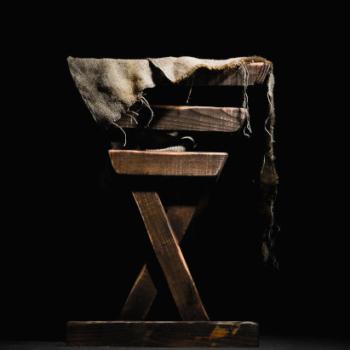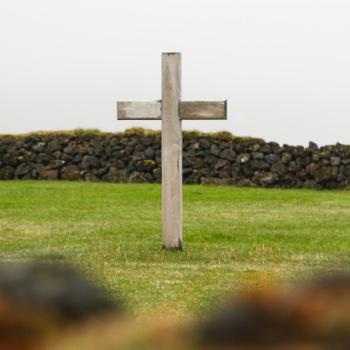
As Christians, most of us are accustomed to associating Jesus’ death with our justification. Jesus bore our penalty in his death on the cross so that we could be acquitted and counted righteousness. In other words, so that we could be “justified.”
But Romans 4:25 says that Jesus was “delivered up for our trespasses, and raised for our justification.” In other words, the resurrection of Jesus was the event at which his followers were declared to be righteous.
I believe that understanding what Paul is getting at there is crucial to understanding New Testament theology. Indeed, I think doing so will go a long way towards plugging what I’ve called the “resurrection-shaped hole at the heart of evangelical theology.”
But to understand Paul’s meaning, we need to take a step back. We need to understand what the Jews thought about resurrection long before Jesus was ever raised.
Resurrection as Final Judgment in Daniel
The first thing we need to see about resurrection in Jewish thinking was that it was associated with final judgment. In fact, if we turn back to Daniel 12, we find a prophecy about the last days, when God will come to judge the world. And Daniel has this to say about that period.
But at that time your people shall be delivered, everyone whose name shall be found written in the book. And many of those who sleep in the dust of the earth shall awake, some to everlasting life, and some to shame and everlasting contempt. And those who are wise shall shine like the brightness of the sky above; and those who turn many to righteousness, like the stars forever and ever.
This is one of the clearest prophecies of resurrection in the Old Testament. And it’s clear that resurrection to everlasting life is the verdict pronounced on the righteous. In other words, according to the framework of Daniel 12, to be resurrected is to be found righteous in the final judgment.
And the imagery and logic of this passage are picked up and confirmed in the “great white throne judgment” of Revelation 20. God judges humanity from his throne, the dead are judged according to what is “written in the books” (language borrowed directly from Daniel 12), and those whose names are found in the Lamb’s book of life enter the heavenly New Jerusalem where “death will be no more.”
Resurrection as Vindication
And this link between resurrection and final judgment was not lost on the Jews. Rather, they clung to the hope of future resurrection as the day when they would be vindicated against their enemies. They associated resurrection with God’s coming declaration that they had been in the right all along and with God’s coming judgment on their oppressors. As evidence, we need only turn to a grisly scene from 2 Maccabees 7.
(Disclaimer: I do not consider 2 Maccabees inspired. But, like any other ancient text, it’s a helpful source of historical background information. I read it solely on that basis.)
In 2 Maccabees 7, which is set between the return from exile and the birth of Jesus, the evil king Antiochus tries to get seven Jewish brothers to transgress God’s law by eating pork. They all refuse, despite torture and threats of execution. And as they go to their deaths, they cling to the future hope of resurrection as their deliverance and vindication.
Here’s what the second brother says, for example.
You accursed wretch, you dismiss us from this present life, but the King of the universe will raise us up to an everlasting renewal of life, because we have died for his laws.
The fourth brother’s statement is similar.
One cannot but choose to die at the hands of mortals and to cherish the hope God gives of being raised again by him. But for you there will be no resurrection to life!
Finally, the last brother is even more explicit about the divine judgment awaiting Antiochus.
You have not yet escaped the judgment of the almighty, all-seeing God… you, by the judgment of God, will receive just punishment for your arrogance.
If you read this chapter in full (it’s available on BibleGateway), you’ll find that the overall worldview adopted by these brothers is the same one as we saw in Daniel 12. These ancient Jews believed that God was coming to judge the world at the end of time, that those who were found to be righteous would be resurrected to everlasting life, and that judgment awaited God’s enemies.
Resurrection and Forgiveness
The other association we need to make in order to understand the relationship between the risen Christ and our justification is the link between resurrection and the forgiveness of sins. And if we turn to the prophecies of the Old Testament, we find that these are both features of the age to come. They are both things which Israel would have looked forward to as their end-time hope.
For example, in Ezekiel 36-37, Ezekiel is describing a future end-time restoration of Israel. It famously includes one of the most prominent resurrection prophecies in all of scripture: the valley of dry bones. Ezekiel sees a valley of dead bones, representing the people of Israel. God commands him to prophesy over the bones and, as he does, they form back together into bodies. Then God commands him to prophesy “to the breath” (or spirit), and the spirit comes and breathes life into the bones. It’s beautiful resurrection imagery, associated with the last day.
But just a few verses earlier, in Ezekiel 36:33, there’s another association with the last day: forgiveness of sins. God describes the time of Israel’s restoration, the time of the dry bones becoming flesh, as “the day that I cleanse you from all your iniquities.” Resurrection and forgiveness are therefore both end-time hopes of the Jewish people.
Justified by the Spirit
The question, then, is what happens when this Jewish worldview, which associated resurrection with the final judgment and the dawning of a new age characterized by the forgiveness of sins, collides with the historical reality of Jesus’ resurrection? And I believe the result is the New Testament doctrine of justification.
Let’s start with final judgment. If resurrection is the reward of those who are found righteous at the final judgment, and Jesus has been resurrected, then it’s as if Jesus has already been judged at the last day, and already found to be righteous! In short, Jesus’ resurrection was his justification.
Paul hints at this in 1 Timothy 3:16, when he writes that Jesus was “vindicated [Greek: justified] by the Spirit.” The spirit (or “breath” in both Greek and Hebrew) was the force that gave Adam life in the beginning, that breathed new life into Ezekiel’s dry bones, and which gives resurrection life to mortal bodies in Romans 8:11. So I don’t think it’s a stretch to say that when Paul says Jesus was “justified by the Spirit” he means that he was justified when the Holy Spirit raised him from the grave.
And here’s where it gets awesome: if Jesus has already been justified in his resurrection, then all those who are “in him” (John 15-17) can be considered justified as well. Through our union with him, he has taken on our sin, so that it could be paid for. And, also through our union with him, we can take on the end time not-guilty verdict that was already pronounced over him at his resurrection. In that sense, Jesus truly was “raised for our justification.”
An Age of Forgiveness
The second thing we can say about the resurrection of Jesus, considered against the backdrop of Jewish expectations about resurrection, is that it starts bringing the last days into the present. Resurrection was a feature of the age to come. But it starts arriving in the here and now when Jesus is raised from the dead. And the final judgment is supposed to be, well, final. It’s supposed to happen at the end. And yet, the verdict of that final judgment has already been pronounced over Jesus and all those who are united to him. The last days are occurring now.
And, of course, as we already saw in Ezekiel 36, one of the defining features of the age to come was the cleansing of sin. If Jesus has been raised, then the end-time promises of God are starting to come true. And that means the forgiveness spoken of by the prophets has been made available as well, through the death and resurrection of Jesus.
Conclusion
There are so many other things we could say about justification and the resurrection of Jesus. But I want to end by quoting Romans 4:25 again. Jesus was “delivered up for our trespasses, and raised for our justification.” As that verse suggests, the death and resurrection of Jesus were the events in which God judged the world in two key ways. He poured out his just retribution against sin and guilt on the crucified Jesus. And then three days later he brought the gavel down to pronounce a life-giving “not guilty” verdict over both Jesus and his people. And that verdict has reverberated through history ever since.
(Note: I am heavily indebted to N.T. Wright for many of the ideas in today’s post. If you’d like to understand the resurrection better, I recommend his The Resurrection of the Son of God. It’s quite an undertaking to read, but the payoff is worth it.)
Questions or comments about resurrection and justification? Please reach out in the comments below. And come back in the coming weeks for more posts on the resurrection! I might take a week or two to explore another subject, but I’ll be back on the resurrection soon! I usually post new articles on Tuesday mornings.
You can also follow me on Twitter if you’d like to get reminded when I post something new.












